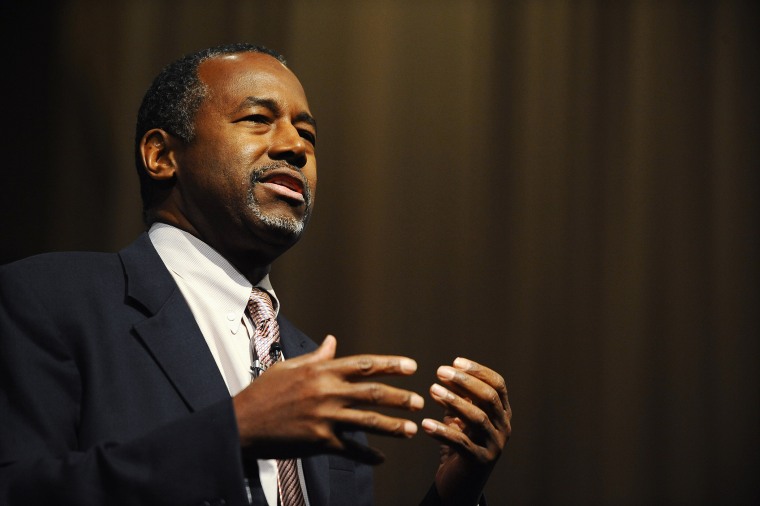About a month ago,
New York's Jon Chait
questioned whether Ben Carson is running a Republican presidential campaign or a "clever marketing scam." I don't imagine the candidate or his supporters appreciated the argument, though questions about Carson's political operation are hardly unfounded. The
L.A. Times published a doozy of a report over the weekend.
Before he entered the race for the White House, Ben Carson signed on to a campaign to raise money to fight Obamacare. When Juanita McMillon saw his name, she was eager to get out her checkbook. "I think he is sincere, and I think he is honest, and I think he is exactly what we need," said McMillon, 80, from the small town of De Kalb in northeast Texas. She gave $350. Her money went to the American Legacy PAC, an organization with ties to former House Speaker Newt Gingrich. With Carson as the face of its Save Our Healthcare campaign, American Legacy raised close to $6 million in 2014 -- and spent nearly all of it paying the consultants and firms that raised the money. Just 2% was donated to Republican candidates and committees, financial reports show.
The whole point of a political action committee -- any political action committee, really -- is to create an entity that raises funds to be distributed to allied and like-minded candidates. But Carson's venture, like
so many similar entities in conservative politics, raised several million dollars, nearly all of which went to the consultants who created the operation, rather than candidates for public office.
This is, alas, incredibly common on the right. Tea Party PACs, in particular, have proliferated in recent years, raising tens of millions of dollars, which
regularly line the pockets of the people who created the committees. As
Slate's Jamelle Bouie
noted in early October, "a good deal of conservative politics is an elaborate scam for cash."
But Carson and "American Legacy" aren't just some random scam PAC, exploiting Carson's credibility for big bucks. This is a very different kind of story.
What we've seen in
a few classic cases is a Republican candidate running for president and failing, but then turning his mailing list into a lucrative, ethically dubious operation. Team Carson has largely flipped that model on its head, creating a sketchy operation first, and then using it to fuel a Republican campaign. From the
L.A. Times report:
Though American Legacy didn't raise much money for Obamacare-hating Republicans, it was a success at something else -- finding people willing to give to Carson. Using those names, and another list generated by a second "super PAC," Carson's campaign built a network of individual donors that has far outraised those of his rivals. [...] Using old-school tactics like direct mail and telemarketing -- mainstays of conservative fundraising campaigns for decades -- [American Legacy's] consultants sent out blanket appeals, "prospecting" for passionate Carson supporters. Many turned out to be older, conservative voters captivated by his religious faith and up-from-poverty life story.
These folks often assumed they were writing checks to Carson. They were not. The money went to American Legacy, a Newt Gingrich venture with "a history of churning donors' money in fundraising costs."
But in this case, when Carson launched his White House bid, he simply returned to those same donors for more cash.
What's the message to those contributors who sent money to American Legacy PAC, who were under false impressions about where the money was going? Doug Watts, a Carson campaign spokesman, told the L.A. Times, "I would say to those people, you did give to Dr. Carson," Watts said. "They participated in the building of a list" of donors for the campaign.
Got that? You sent money to a PAC, thinking you were supporting Carson and like-minded candidates. In reality, almost all of the money went to consultants and direct-mail firms, but as far as the Republican campaign is concerned, those same donors ended up on another fundraising list -- and Team Carson believes list-building is effectively the same thing as giving to Carson.
"[M]uch of movement conservatism is a con," MSNBC's Chris Hayes
said a couple of years ago, "and the base are the marks." It's a point with ongoing relevance.
